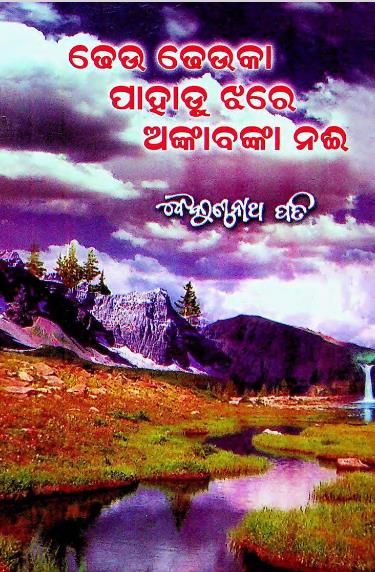Baikunthanath Pati, a prolific figure in Odia literature, has a remarkable ability to weave the intricate threads of nature, childhood, and dreams into his poetry. His poem Dheu Dheuka Pahadu Jhare Ankabanka Nai, published in 2012, stands as a testament to his literary prowess, encapsulating the essence of childhood and its unadulterated connection with nature.
The title of the poem, which translates to The Mist Falls from the Mountains, There Are No Boundaries, immediately invokes imagery of serene landscapes and the simplicity of rural life. Pati captures the beauty of Odisha’s hills, where the mist gently envelops the peaks, creating a dreamlike atmosphere. Here, the mountains are not just geographical formations; they represent a world of imagination and freedom, reflecting the boundless spirit of childhood.
At its core, this poem serves as a celebration of the innocent joys and adventures that define childhood. Pati’s verses are imbued with a sense of nostalgia, inviting readers to reminisce about their own youthful experiences. The poet presents vivid images of children playing in the fields, smearing their faces with the colors of the earth, and running wild under the vast blue skies, untouched by the burdens of adult life. This imagery resonates deeply, as it reminds us of the purity and freedom of early childhood—an age where every day is an adventure and every moment is filled with wonder.
Pati skillfully employs various literary techniques to enhance the poem’s emotional depth. His use of metaphors and similes draws parallels between nature and the inner world of children. The mountains and mists symbolize the dreams and aspirations of the young, suggesting that, like the ever-changing weather, childhood is a fleeting yet beautiful phase of life. The interplay of light and shadow in the verses also mirrors the complexities of growing up—where innocent joys coexist with the inevitability of life’s challenges.
Moreover, the poem takes on a broader significance as it subtly critiques the societal norms that often restrict the freedom of children. In a world where adult concerns overshadow the simple joys of youth, Pati advocates for a return to nature and an embrace of the imagination. The phrase Ankabanka Nai (There Are No Boundaries) serves as a powerful reminder that the essence of childhood lies in its uninhibited quality. It suggests that as children, we should be allowed to explore, dream, and express ourselves without constraints.
In reflecting on Dheu Dheuka Pahadu Jhare Ankabanka Nai, it is evident that Baikunthanath Pati is not just painting a picturesque landscape of Odisha but is also creating a metaphorical landscape of childhood itself. His work resonates with anyone who has ever felt the pull of nostalgia or longing for a time when life was simpler and imbued with endless possibilities.
Ultimately, this poem serves as a call to cherish and protect the world of children—a world that should be enriched by nature, creativity, and boundless imagination. Through Dheu Dheuka Pahadu Jhare Ankabanka Nai, Pati invites readers to revisit their own childhood dreams while advocating for a society that values and nurtures the innate wonder within each child. It is a timeless reminder that in the face of life’s challenges, the spirit of childhood remains a beacon of hope and joy.
Books Info
| Books name | Dheu Dheuka Pahadu Jhare Ankabanka Nai / ଢେଉ ଢେଉକା ପାହାଡୁ ଝରେ ଅଙ୍କାବଙ୍କା ନଈ |
| Author | Baikunthanath Pati |
| No Of pages | 42 |
| Publisher | Rashtriya Sahitya Sanshtana |
| Publication | 2012 |
| Printed At | Compuprint |
| Distributor | NA |

